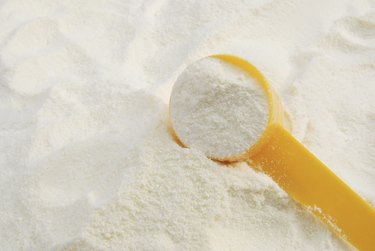
Although they are similar in appearance, dried milk powder and protein powder are two very different products. Cost, composition and taste distinguish these foods. While both can be a healthy addition to your diet, knowing the differences can help you determine which is the best for your needs.
Dried Milk Powder
Video of the Day
Dried milk powder is simply milk from which the water has been removed. It contains all the nutrients of milk except for vitamin C, thiamin and vitamin B12. The powder is 80 percent casein and 20 percent whey protein. Dried milk powder still contains lactose and can cause stomach distress in people intolerant to this milk sugar. Adding water to dried milk powder forms a glass of milk. Protein forms 38 percent of dried milk powder.
Video of the Day
Protein Powder
Whey protein powder is a derivative of milk, but it is 100 percent whey protein. Manufacturers take extra steps to create whey protein powder. You first heat milk until curds form and then strain these off. The leftover whey is processed and formed into a powder. Whey protein contains very little lactose, so people with lactose intolerance can usually tolerate it. Whey protein isolate is 90 percent or more protein, while whey protein concentrate is 29 to 89 percent protein. Casein, the other type of protein in milk, is also available as a protein powder. It digests more slowly than does whey and is the type of protein that usually triggers allergies in people with sensitivities to milk. You can also purchase other types of pure protein powder, such as egg white, soy, rice and pea. These protein powders are good alternatives for vegans or people with milk allergies.
Use
You use dried milk powder as a substitute for liquid milk or to boost calories in smoothies, soups and casseroles. While you could use dried milk powder as a post-workout drink, whey protein is the drink of choice for many strength-training athletes. The whey is quickly digested and available to muscles for repair, recovery and growth. You can add whey protein to smoothies, casseroles and soups – you can even use it in baked goods. It has no carbohydrates, however, so it cannot be used as a substitute for dry milk powder in recipes.
Considerations
Dried milk powder costs very little compared with whey protein powders. Dried milk powder comes in both instant and non-instant varieties. Protein powders sometimes come as part of a mixture that contains extra amino acids, carbohydrates or other supplements that claim to boost muscle growth and athletic performance.